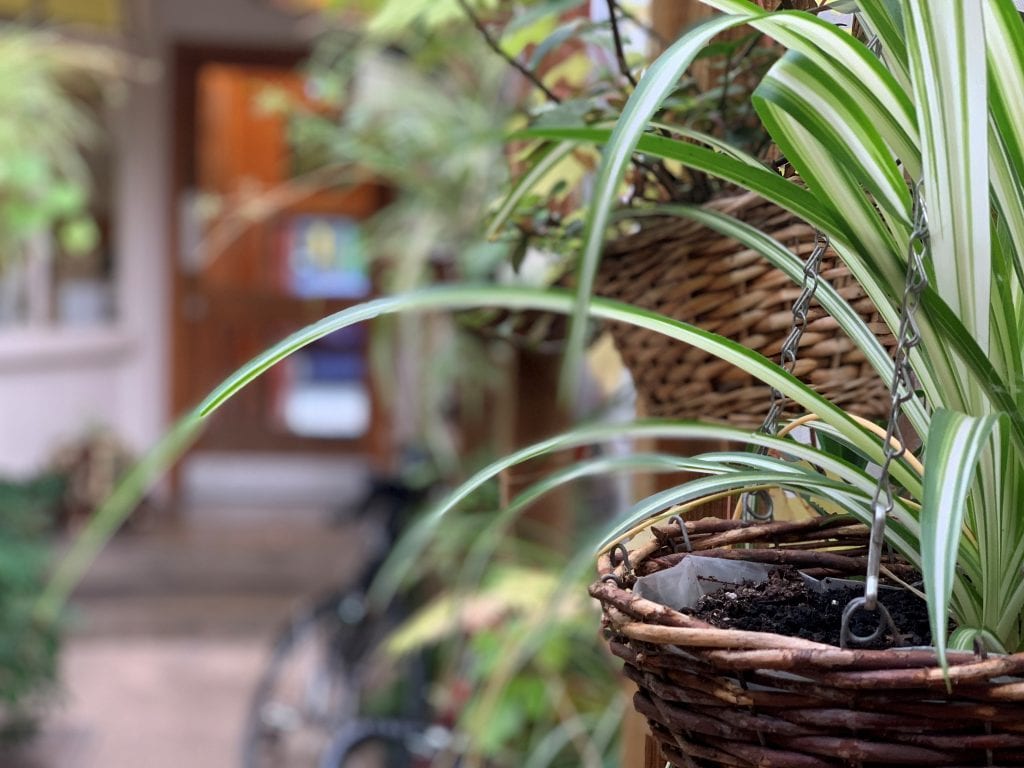“The energy and commitment in the room was invaluable. We got some very thoughtful feedback that will guide us in the future developments.”
Safe Haven Team
The event was organised by Oxford Safe Haven (OSH), a project run by Oxfordshire Mind in partnership with Elmore and Oxford Health. The purpose of the event was to share current Oxford Safe Haven development and to gather feedback and ideas for future improvements.
We invited people who have used the service, their carers and those who have experienced mental health crisis in the past. The format of the event was in a relaxed café style, we repeated it from the last year event as the feedback said that it worked really well. Food and drinks were provided. We also created a mini Safe Haven Space for those who found work in a big group overwhelming at times. It was important for us that everyone felt safe and included. People had an opportunity to give feedback in small working groups (verbally or in writing), or by talking to a member of staff individually.
“You said, we did…”
Question 1:
What support do you value most when in mental health crisis and why?
‘Staff were very friendly and welcoming. Questions were quite challenging to answer. Ideas were good. Food was lovely! I think Safe Haven has a good future ahead!’
“You said”:
You arranged the areas in order of what support is most important to you:
· Somewhere where you can feel safe. This is because you are surrounded by people who are kind and nonjudgmental and where you can express how you feel and be accepted for who you are. One of the carers said that it helps them knowing that their loved one is safe as this offers them a break too.
“[It is important to me] having someone to simply be with me even if I can’t verbalise how I feel”.
· Focusing on something different by using distractions in the form of conversations, games, music or art activities. You said this needs to be optional and with a variety of things to choose from including music, drawing, games, and sensory activities.
· Opportunity to speak to someone. You equally highlighted the importance of being able to confidentially speak to a member of staff and engage with other service users who accessed the service that night. When speaking to a member of staff you appreciate confidentiality, space to talk and not being asked too many questions. Staff can also offer the opportunity for Safety Planning that some of you found particularly useful in the times when you felt suicidal.
“Staff can suggest additional support that may be appropriate”. – Community Involvement Attendee
In terms of the contact with others you find it can be very supportive, reduce your distress and you can learn from each other. However you highlighted that this needs to be without any expectations that you need to support each other.
“Two hours very well spent, got lots done in the time – very time efficient. Good to hear about future plans for the organisation.” – Community Involvement Attendee
“We did”:
We are constantly trying to improve the service and pay attention to the atmosphere we create. We make sure the service is welcoming and create a space that is safe, away from your usual triggers. We are open to further suggestion of what can make the space feel safe for you.
We know that using activities to refocus can be very beneficial when in crisis and can help people focus on something different, even if this is just for a short period of time. We always strive to improve and introduce new activities so there is something for everyone. We have a designated budget for “distractions” and when people attending the service express interest in an activity we would aim to get it as we have done with some games and books that have been suggested by service users in the past. Additionally, not long ago we set up a herb garden that can be used to touch and smell the herbs. We regularly purchase new games, colouring and puzzle books to keep activities as varied as possible.
We offer a limited opportunity for confidential time with staff one to one, it is limited due to space and staff availability at times. The aim is to support you with your distress and offer safety planning if required. We do not have a protocol of what questions to ask, we aim to respond to your needs but might ask you questions related to your support and safety. At times we might suggest using contact with others in the service over a confidential chat with staff if we notice that talking things over is not working for you.
It is always great to see when people are able to chat with each other and exchange information that is useful. After consulting people who use our service, we reviewed OSH safety guidance where we ask people to not offer support to each other when in crisis.
Question 2:
How can we offer an adequate support to those referring to the service when the service becomes oversubscribed?
“A very well thought out event. A lot of really useful discussion happened. Lovely food! Thank you a so needed service.”
At the moment we can accommodate up to 12 people per night – this however means that place can feel very busy and not everyone is able to get individual support. Some people might find busy place stressful at times of crisis. This also means that people who call when the place is full might not get support on that night. With increasing number of people we are facing a challenge of deciding how to offer adequate support to those who are being referred or self-referred to OSH.
“You said”:
From your experience 12 people attending the service at the same time could feel overly busy in the space we have. Additionally, if we fill up all spaces then this does not leave us with any opportunities for any emergency visits. You suggested that we open 10 spaces and always keep 2 for any emergencies, as it is important that everyone in crisis have somewhere safe to go.
You discussed the following ideas (in order of preference):
· People attending the service for 2 hours. There were two options discussed:
1) If we reach capacity and someone is waiting to access – approach people who are already in to shorten their visit to free up a space, or
2) Split the session into two two-hourly ones 6-8 and 8-10 in order to offer more spaces and have less crowded rooms.
This would free up a space for people in crisis and some people may only want 2 hour support and get all the benefits in that time. The downside would be that some people might need more time to use the service. Additionally, if the groups are smaller there also might be less opportunity for social contact.
· Form of triage – either self-monitoring by using a form or staff asking more questions over the phone. You identified that this would not work for everyone and some people might feel pushed away.
· Phone support – you asked if it would be possible to have phone support by staff or peer supporter instead.
· Group within the Safe Haven – this would be something that could support people with physiological feelings of crisis by using grounding techniques and could be facilitated by a peer supporter.
“Very well structured and encouraging everyone to feel they can speak. Lovely event.”
“We did”:
We straight away adopted the idea of keeping 2 emergency spaces for any new and emergency referrals. We really liked the way other ideas were discussed with a lot of thought given to how people might feel. From our observations people generally tend to stay 2 hours to get the support they need. There are some however that would find this difficult – it is a difficult decision to make and before we consider this idea further we will be exploring other options.
The idea of triage has been adopted by other similar services in the country. At Oxford Safe Haven we aim to make the service as inclusive as possible and therefore make the referral based on you opting in rather than us defining your crisis. This would be something we would consider only as a last resort.
Reducing use of the service – this is the idea that we were thinking about for some time too. We have noticed some downsides of using the service on a regular basis:
· The effectiveness of support in crisis is lower,
· People have less confidence in their own abilities of dealing with crisis because they use it less,
· Disengagement from other regular support.
Where we observed this happening, we asked people to think about how they use the service and come up with a self-set plan to reduce the attendance in the times they are attending preventatively. We are aware that this might feel like a rejection to some and we aim to do it in a supportive way explaining clearly the reasons behind it.
Going forwards, we asked that people use OSH primarily in crisis and if they feel they need a bit more support post crisis or preventatively this would be possible for a limited time only and for a maximum of 6 weeks.
Phone support by staff or peers is not something that we are able to provide at the moment, but we are however able to signpost to other services that can offer support over the phone.
We conclude that this topic is a difficult one and we are very grateful for your voices and support. We do not have a clear answer at the moment, but we will keep thinking and asking questions to identify the best option.
“It was nice to feel that my opinion mattered.” Community Involvement Attendee
Qusetion 3:
Wellbeing-Crisis scale – what works for you?
The purpose of this question was to understand how people manage in different stages of their wellbeing and how Oxford Safe Haven could be helpful to them and at what stage/stages?
“You said”:
You created a very useful list of things that can help you at different stages of your mental health using your own coping skills or other resources including friends, family, professionals and services. The majority of you said that they would use Oxford Safe Haven in Crisis, or when you feel crisis coming, to stop yourself from escalating further. You said that it would be useful to have a visual aid to get ideas of what can help in crisis.
“I found the meeting very informative, and lots of good points were raised. I enjoyed the group talks. It’s so amazing that people came! Loved the samosas.”
“We Did”:
Oxford Safe Haven was set up to support people in crisis, however we recognise the importance of prevention and would welcome people who would like to access preventatively for a short period of time. Since the event, based on your suggestion, we set up a board to encourage people to write down what works for them in crisis. The idea is to use it as a useful source of ideas for others.
‘I found the meeting very informative, and lots of good points were raised. I enjoyed the group talks. It’s so amazing that people came! Loved the samosas.’
‘Very well structured and encouraging everyone to feel they can speak. Lovely event ’
‘The quiet space was really helpful. Some of the wording of questions was difficult to understand.’
‘Supportive environment, good food, lots of thought put into experience of afternoon. I do worry about the lack of crisis drop in provision during the day putting pressure on Safe Haven.’
‘Staff were very friendly and welcoming. Questions were quite challenging to answer. Ideas were good. Food was lovely! I think Safe Haven has a good future ahead!’
‘Good to give feedback on a service! Crises happen all times of the day! I believe night times are the worse. Having an out of office hours service is great.’
‘2 hours very well spent, got lots done in the time – very time efficient Good to hear about future plans for the organisation.
‘It was nice to feel that my opinion mattered.’
‘Always a pleasure to meet the OSH staff.’
‘Thank you for a great session. I haven’t ever used Safe Haven as my high levels of anxiety have prevented me from going, but I am hoping that this is something I could use in the future.


